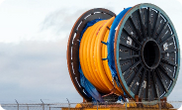When Should You Use PVC Schedule 40 vs. PVC Schedule 80 Conduit?
Should you use Schedule 40 or Schedule 80 conduit to protect electrical wiring in your home? Spoiler: The answer is probably PVC Schedule 40. Let's compare the two to find out.

Are PVC Schedule 40 and PVC Schedule 80 conduit or pipes?
PVC Schedule 40 and PVC Schedule 80 can refer to both conduit and pipe, the difference is just in applications, so PVC 40 pipe and PVC 40 conduit are the same. As pipes, PVC Schedule 40 and PVC Schedule 80 are used to transport water, gas, and other fluids. Some of these applications include plumbing and irrigation. For applications such as pipe, parameters like pressure matter for PVC Schedule 40 and PVC Schedule 80.
For the sake of this blog, we will not focus on when PVC Schedule 40 and PVC Schedule 80 are used as pipes and will focus only on their applications as electrical conduits used to protect electrical cables from the influence of external factors. In this context, factors like mechanical protection and durability matter more than pressure.
PVC Schedule 40, PVC Schedule 80, And Applications
Schedule is the standard that measures the thickness of electrical pipes developed by ASTM (American Society for Testing and Materials). The main factor distinguishing Schedule 40 and Schedule 80 PVC is the thickness of these materials. The thickness of the Schedule 40 wall is 0.133', while the thickness of the Schedule 80 wall is 0.179'. This determines the main differences in applications of these two conduit sizes, even though they can have the same diameter.
- Schedule 40 PVC conduit is usually white, while Schedule 80 PVC conduit is gray.
- Because of its thickness, Schedule 80 PVC conduit is thicker and more durable. It offers superior mechanical protection.
- PVC Schedule 80 mechanical conduit has superior UV resistance to PVC Schedule 40, making it more suitable for applications with direct sunlight exposure.
- PVC Schedule 80 is more expensive than PVC Schedule 40 (about 20% to 50% more expensive depending on the manufacturer).
PVC Schedule 40 suits all PVC conduit applications outlined in section 352 of the National Electric Code (NEC).
These are:
- Concealed within walls, floors, or ceilings
- Directly buried
- Embedded in concrete
- Used in areas subjected to corrosion as long as the local jurisdiction permits.
- In wet locations with corrosion-resistant fittings
- In dry and damp locations
- Underground
- To support other nonmetallic conduit
- If the ambient temperature is or is below 50℃
- For exposed work, as long as it is not subject to physical damage
The last note about the physical damage is what constitutes the main difference in applications between PVC Schedule 40 and PVC Schedule 80. Because of its thickness, PVC Schedule 80 can be used in areas where it is exposed to physical damage.
Based on that, PVC Schedule 40 is recommended as an electrical conduit for residential and light commercial applications where the cable is not subject to physical damage. This includes running electrical wiring through homes and offices, as well as direct burial.
PVC Schedule 80 should be used as an electrical conduit in the areas subjected to physical damage in industrial conditions. For most residential applications, PVC 80 is an overkill.

Cables Used With PVC Schedule 40 and PVC Schedule 80
For PVC Schedule 40:
- Nonmetallic Sheathed Cable (NM Cable) is used in residential for dry, indoor applications. It is often run through PVC Schedule 40 conduit for additional protection when required by code or for physical protection in exposed locations.
- THHN/THWN Wire are individual insulated wires mostly pulled through conduit systems, including Schedule 40, for various residential, commercial, and industrial applications. THHN is rated for high temperature and dry locations, while THWN is rated for wet conditions.
- Low-voltage cables are used for telephone, internet, television, and security system wiring. Schedule 40 conduit provides physical protection for these cables in both indoor and outdoor installations.
For PVC Schedule 80:
- Since THHN/THWN Wire is a versatile cable designed for conduit, it can be used with PVC Schedule 80 as well.
- Additional cables used with PVC Schedule 80 are XHHW Wire and control/ instrumentation cables.


















